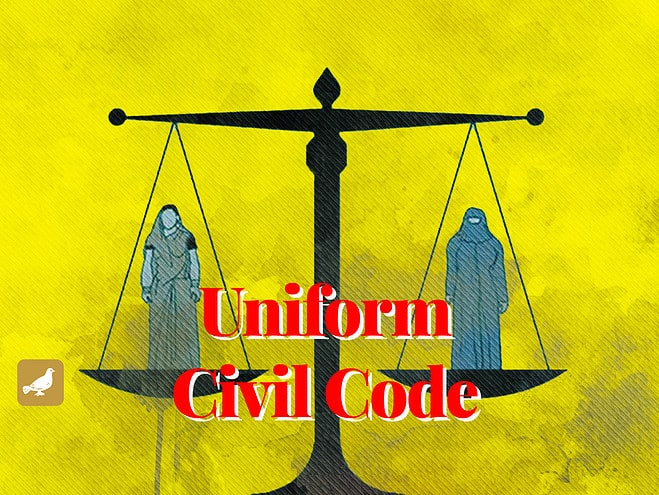Sudden escalation of UCC debate needs to be seen in light of four State elections due in November-December and next Lok Sabha poll

Since Independence, apart from the Bharatiya Janata Party, no other political party in India has endorsed the adoption of a Uniform Civil Code (UCC) as one of its guiding principles and policies. Since 1951, when the pre-Emergency version of the BJP, the Bhartiya Jana Sangh, was born, “application of the Constitution in Jammu and Kashmir as in the rest of the country” and adoption of a “Uniform Civil Code” have been the backbone of the saffron party’s political and ideological agenda. The demand for Ram Temple at Ayodhya entered the BJP’s political agenda much later, as late as the late 1980s. As the BJP’s second full majority government has entered its final year, the only unfulfilled core agenda for the Hindutva party and the RSS, is the implementation of the UCC.
Given the track record of its nine-year rule, which has witnessed increasing fanaticism of the ruling party and growing zealotry of the Hindutva organisations that deride the vision of an India that accommodates all faiths and protects their fundamental rights, whenever the BJP rakes up the demand for UCC, a key part of its election manifesto, it obviously evokes circumspection and suspicion. This raises two questions. One, why is there sudden escalation in demand for the UCC? And two, why is the Uniform Civil Code so contentious in India?
It is generally believed that it is only the Muslims who have a problem with UCC. But the fact is it is not just the Muslims — other minorities, the adivasis of the central and eastern states and the tribal communities of the north-eastern states also have many concerns and worries over the UCC. Since the UCC aims to enforce a uniform legal framework to all citizens with a set of common laws for all religions governing personal matters like marriage, divorce, adoption, inheritance, child custody, alimony and others, people opposed to it say that the UCC could infringe upon religious freedom and might clash with diverse religious practices.
In the light of India’s religious and cultural diversity, there are arguments that different communities should have the right to protect their distinct customs and practices and, therefore, a common law should not be enforced on them without their consent. On the other hand, supporters of the UCC argue that a common law is important for national integration and equality of genders and religions. They also believe that personal laws based on religion can sometimes be discriminatory, especially against women. Another reason cited in favour of UCC is that it will make legislation in terms of succession and divorce easier and will quash a lot of outdated religious personal laws.
While the UCC can be traced back to the debates during the framing of the Constitution and a fair idea finds a mention in Part IV of the Constitution which deals with Directive Principles of State Policy, Article 44 mentions that the “state shall endeavour to secure a Uniform Civil Code for the citizens throughout the territory of India”. Though the demand for implementation of the UCC has come up many times, notably in 1985, during the hearing of the Shah Bano case, no political party has batted for it repeatedly except the BJP.
The UCC pilot project started almost a year ago with the constitution of an expert panel in Uttarakhand by the BJP state government. Then the current (22nd) Law Commission, which met the Uttarakhand committee, shot off a missive last month to all stakeholders seeking their views on UCC. But the earlier (21st) Law Commission, which undertook exhaustive, nationwide consultations had said in 2018 that the “UCC is neither necessary nor desirable”. The commission concluded that it was better to reform each set of family laws separately rather than replacing them with one law.
So, what has changed in the last five years? Certainly, the Muslims, the adivasis and tribal communities have not changed their views on the UCC. Therefore, one wonders what the 22nd Law Commission hopes to achieve by re-starting the debate. The question that arises is: why is the BJP so aggressively after the UCC now? More than an ideological promise, the key reason behind the sudden escalation of the UCC debate needs to be seen in the light of the four state elections that are due in November-December and the next Lok Sabha poll, which is less than a year away. Given the partisan and Hindu-Muslim binary discourse on the UCC, the immediate issue for the BJP and RSS is not so much the enactment of the law as such, but the accompanying sound around it that will add to the election melee and polarisation of the electorate.
Recently Prime Minister Narendra Modi made a strong pitch for the UCC in Bhopal, justifying the BJP’s renewed quest for UCC by saying “one home cannot have different laws”. But the problem with this analogy is that a home is ought to be a place of respectful co-existence, where there is order and which is marked by enabling attitudes, and not by hostile barricading against members who lack power and ability.
Last week, at a meeting of a Parliamentary committee on personnel, public grievances, law and justice, its chairman, Sushil Kumar Modi, who represents the ruling BJP in Parliament, questioned the feasibility of a UCC in Northeast states and for tribals. This suggests discomfort with the UCC even within the government’s own ranks. So, why not go by the earlier law panel’s advice, which had said that a “united” nation need not necessarily have “uniformity”? After all, India is like a world and it is better to maintain and respect its diversity than enforce uniformity.
--FPJ